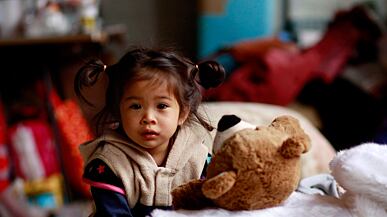Days after the earth heaved and waves pummeled northern Japan, Western comment boards and blogs lit up over the fate of the tsunami's most vulnerable victims: the newly orphaned. "I want to take 1 or 2 of these kids [home] with me," wrote a commenter on The Imperfect Parent. "I'm rich and I can afford it," another person posted on Yahoo! Answers. A prospective parent on CNN.com gushed that their "little orphan baby" would be brought up "with lots of love!" Even formal organizations, from the Kyrgyzstan government to the National Association of Japanese Canadians, explored the idea of temporary shelters, adding to a now familiar chapter in stories of war and natural carnage.
"The motif is in place," says Karen Dubinsky, author of the book Babies Without Borders, a study of child-lift operations in the Americas. "Oh, a disaster. We know what to do: go get the babies."
While an exact count of Japan's tsunami orphans is not yet available, more than 25,000 people are dead or unaccounted for in the island nation, and local experts predict that the toll may rise as high as 100,000. That's more than 10 times the number of fatalities caused by the Great Hanshin earthquake of 1995, which left hundreds of children parentless, and many fear that this month's disaster could prove magnitudes more devastating to domestic order. It struck during school hours, after all, when many children were in relatively safe structures--and separated from their parents.
Now hundreds, if not thousands, of unclaimed children await aid in temporary shelters along the country's ravaged coastline, where, according to a British media report, the usual crayon and pencil sketches of youth have skewed toward eerie and macabre images of an angry sea. To the discontent of their caretakers, some children stack Legos only to topple them and shout "tsunami!" This week, in response to the burgeoning orphan problem, Japan's Health, Welfare and Labor Ministry launched an official review, dispatching 400 case workers to count what the ministry fears could be a parentless population greater than from any recent domestic disaster.

Foreigners hoping to adopt one of these youngsters, however, shouldn't count on success. "Japan isn't Haiti," says Adam Pertman, director of the Evan B. Donaldson Adoption Institute, referring to the Caribbean earthquake of 2010, when more than a thousand orphans were sent to America. He might have added that Japan is also not India--which shipped nearly 500 kids off to the States after a tsunami in 2004--or, for that matter, Korea, Vietnam, Cuba, Romania, Russia, Guatemala, or any of the nations where so-called disaster adoptions have spiked at some point since World War II.
Only about 25,000 children are classified as orphans in the country of some 127 million people.
One difference is economic: Japan is a wealthy, modern country with the resources to shelter its needy. But perhaps the biggest reason is cultural. Japan is among the most adoption-averse nations on earth, with extended families usually stepping in as surrogate parents when there is need. Only about 25,000 children are classified as orphans in the country of some 127 million people, according to the Joint Council on International Children Services (JCICS), and of those, fewer than 500 a year are adopted by another Japanese family. International adoptions are even more rare, occurring less than 50 times a year, according to Japanese government data. "It's just not culturally popular," says Tom DiFilipo, the president of JCICS.
By contrast, the United States is twice as populous as Japan but produces 50 times as many orphans—almost two million overall in 2009, according to the U.N. children's agency, UNICEF. The turnover is also immense. More than a million U.S.-born kids are adopted and or added to the foster care rolls each year. Not so in Japan. Only around 10 registered adoption agencies serve the nation and few, if any, of those are bracing for a tsunami-related influx. "I believe we'll see very few [new] orphans," says Tazuru Ogawa, director of the Across Japan adoption agency near Tokyo, because "we consider orphans as those with no other family at all." The water and rubble were deadly, in other words, but no match for the whole family tree.
The Japanese government, for its part, hasn't ruled out anything, telling the The Daily Beast that there is as yet "no official government position on adoption or a summer program for the affected children." If needed, there are nearly 400 existing public orphanages, most with beds to spare and a track record of raising children to adulthood. For Westerners set on helping the recovery one adopted child at a time, such a fate may not sound ideal. But there is solace. Japan has not only the record system to find relatives, but the reverence for bloodlines to inspire those relatives to take kids in. For most of the Tohoku orphans, that means home is perhaps not so far away.
Tony Dokoupil is a staff writer and editor at Newsweek.






